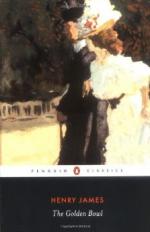different ways, equally trying to save. And they
were saving it—yes, they were, or at least
she was: that was still the workable issue, she
could say, as she felt her dizziness drop. She
held herself hard; the thing was to be done, once
for all, by her acting, now, where she stood.
So much was crowded into so short a space that she
knew already she was keeping her head. She had
kept it by the warning of his eyes; she shouldn’t
lose it again; she knew how and why, and if she had
turned cold this was precisely what helped her.
He had said to himself “She’ll break down
and name Amerigo; she’ll say it’s to him
she’s sacrificing me; and its by what that will
give me—with so many other things too—that
my suspicion will be clinched.” He was
watching her lips, spying for the symptoms of the
sound; whereby these symptoms had only to fail and
he would have got nothing that she didn’t measure
out to him as she gave it. She had presently
in fact so recovered herself that she seemed to know
she could more easily have made him name his wife
than he have made her name her husband. It was
there before her that if she should so much as force
him just
not consciously to avoid saying “Charlotte,
Charlotte” he would have given himself away.
But to be sure of this was enough for her, and she
saw more clearly with each lapsing instant what they
were both doing. He was doing what he had steadily
been coming to; he was practically
offering himself,
pressing himself upon her, as a sacrifice—he
had read his way so into her best possibility; and
where had she already, for weeks and days past, planted
her feet if not on her acceptance of the offer?
Cold indeed, colder and colder she turned, as she
felt herself suffer this close personal vision of
his attitude still not to make her weaken. That
was her very certitude, the intensity of his pressure;
for if something dreadful hadn’t happened there
wouldn’t, for either of them, be these dreadful
things to do. She had meanwhile, as well, the
immense advantage that she could have named Charlotte
without exposing herself—as, for that matter,
she was the next minute showing him.
“Why, I sacrifice you, simply, to everything
and to every one. I take the consequences of
your marriage as perfectly natural.”
He threw back his head a little, settling with one
hand his eyeglass. “What do you call, my
dear, the consequences?”
“Your life as your marriage has made it.”
“Well, hasn’t it made it exactly what
we wanted?” She just hesitated, then felt herself
steady—oh, beyond what she had dreamed.
“Exactly what I wanted—yes.”
His eyes, through his straightened glasses, were still
on hers, and he might, with his intenser fixed smile,
have been knowing she was, for herself, rightly inspired.
“What do you make then of what I wanted?”
“I don’t make anything, any more than
of what you’ve got. That’s exactly
the point. I don’t put myself out to do
so—I never have; I take from you all I
can get, all you’ve provided for me, and I leave
you to make of your own side of the matter what you
can. There you are—the rest is your
own affair. I don’t even pretend to concern
myself—!”




